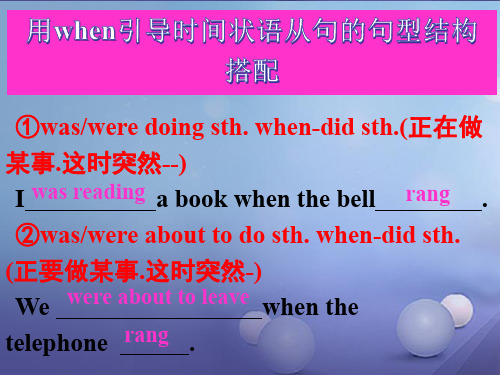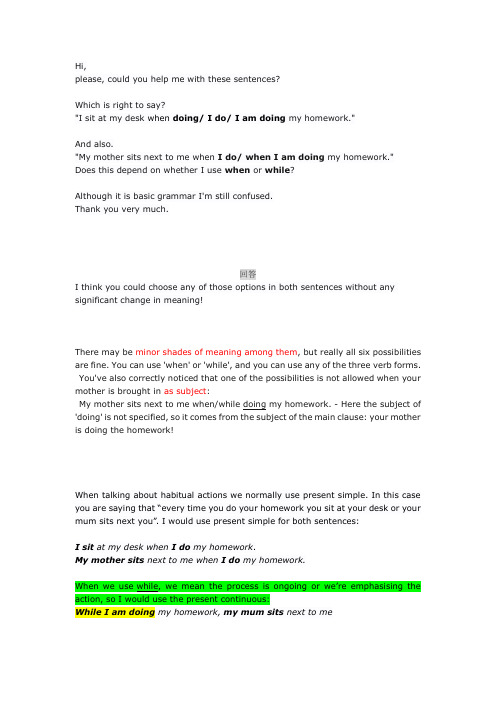when-doing-的用法教学文案
用when引导时间状语从句的句型结构搭配

⑥It the first/second/third-time+ that did / had\have\ has + done 结构中,that-从句通常用过去完成时,有时也用一 般过去时,有时若有包括现在在内的时间状语,偶尔还可用 现在完成时:
I was lucky because that was the second time I(had) visited Japan that year.我很幸运,那是我那年第二次访问日本.
I was about to go out when it began to rain.
2.我正在做作业他就打电话给我。
I was doing my homework when he phoned me.
3.他一到学校就下雨。
No sooner had he got to school had he got to school when it began to rain. He had no sooner got to school than it began to rain.
It was the first time this year that hhe adn’t [hasn’t] work on a Saturday.这是今年来他第一次在星期六不上班.
when的用法总结大全

when的用法总结大全when的用法你知道多少,今日我给大家带来when的用法,盼望能够关心到大家,下面我就和大家共享,来观赏一下吧。
when的用法总结大全when的意思adv. 什么时候,(用于时间的表达方式之后)在那时,其时,当时conj. 在…时,既然,假如pron. 什么时候,那时n. 时间,时候,日期,场合when用法when可以用作副词when的基本意思是“什么时候”。
可用作疑问副词,用来询问某事曾发生或将要发生的时间,引导特别疑问句; 还可用作关系副词引导限制性定语从句、非限制性定语从句和表语从句,表示“是…时候的事”。
when可用作从属连词,引导状语从句,表示时间时作“当…时,在…的时候”解; 表示条件时作“假如,要是”解; 表示对比时作“既然,考虑到”解。
当when所引导的从句的主语和主句的主语全都时,常将其主语、系动词或助动词省去,只留实义动词或表语,或者改写为短语。
when所引导的时间状语从句用一般现在时代替将来时,用现在完成时代替将来完成时。
when用作副词的用法例句When did that happen?那件事是什么时候发生的?They stood respectfully when he entered the room.当他走进房间时,他们都恭尊敬敬地站着。
Iron will melt when it is made very hot.当铁烧得很热时就会熔化的。
when可以用作连词when可用作从属连词,引导状语从句,表示时间时作“当…时,在…的时候”解; 表示条件时作“假如,要是”解; 表示对比时作“既然,考虑到”解。
当when所引导的从句的主语和主句的主语全都时,常将其主语、系动词或助动词省去,只留实义动词或表语,或者改写为短语。
when所引导的时间状语从句用一般现在时代替将来时,用现在完成时代替将来完成时。
when用作连词的用法例句And they roared when Seaman held up two fingers.然后当希曼伸出两根指头的时候他们就吼叫起来。
when用法归纳 讲义--高考英语复习备考

when用法归纳讲义when用法多种多样,下面就对其用法作简单小结。
一、作疑问副词,引导特殊疑问句,意思是“什么时候,何时”例如:When will he leave?他将什么时候离开?When did you see her?你是什么时候见到她的?二、作连接副词,引导名词性从句或动词不定式短语,意思是“什么时候”例如:I remember when this used to be a quiet village.我记得这曾经是一个幽静村庄的日子。
I'd like to know when they will come?我想知道他们什么时候来。
Have you decided when to go sightseeing?你们决定了什么时候去郊游吗?三、作疑问代词,常与介词since,till,up to等连用,意思是“......什么时候”例如:Till when is the library open?到什么时候图书馆才开放呢?They left on Monday,since when(=since Monday)we have heard nothing.他们是星期一离开的,自那以后我们就没有听到任何消息了。
四、作关系副词,引导限制性定语从句和非限制性定语从句例如:The day when(=on which)they were to leave finally arrived.他仍离开的日期终于来到了。
The film brought the hours back to me when I was taken good care of in that faraway village.这部电影使我回想起我在那座遥远的村庄备受关爱的时光。
Sunday is a holiday,when people do not go to work.星期天是假日,(那天)人们不上班。
I will see you in October,when I come back.我将在10月见你,那时我回来了。
英语母语者讨论when doing, I do, I am doing

Hi,please, could you help me with these sentences?Which is right to say?"I sit at my desk when doing/ I do/ I am doing my homework."And also."My mother sits next to me when I do/ when I am doing my homework." Does this depend on whether I use when or while?Although it is basic grammar I'm still confused.Thank you very much.回答I think you could choose any of those options in both sentences without any significant change in meaning!There may be minor shades of meaning among them, but really all six possibilities are fine. You can use 'when' or 'while', and you can use any of the three verb forms. You've also correctly noticed that one of the possibilities is not allowed when your mother is brought in as subject:My mother sits next to me when/while doing my homework. - Here the subject of 'doing' is not specified, so it comes from the subject of the main clause: your mother is doing the homework!When talking about habitual actions we normally use present simple. In this case you ar e saying that “every time you do your homework you sit at your desk or your mum sits next you”. I would use present simple for both sentences:I sit at my desk when I do my homework.My mother sits next to me when I do my homework.When we use while, we mean the process is ongoing or we’re emphasising the action, so I would use the present continuous:While I am doing my homework, my mum sits next to me(I would say that while follows the same pattern as in describing past actions: While I was doing my homework, my mum sat next to me).But that’s the theory… as T azzler says I guess both could be right, I leave that to wiser foreros.。
when时间状语时态的用法

when时间状语时态的用法嘿,朋友们,今天咱们聊聊英语中的“when”这个词的用法,特别是它跟时态的关系。
说实话,这可是个老话题,但每次讲起来,大家总能发现新的乐趣和小秘密。
想想“when”这个词,它在句子里就像是个开关,啪的一声,时间就来了。
比如说“when Iwas a kid”,嘿,那是个多美好的时代啊,没烦恼,天天想着玩。
这个时候咱们用的是过去时,真的是怀旧得不要不要的。
说到“when”,我总想起一个小故事。
那会儿我还小,特别喜欢夏天的傍晚,和小伙伴们一起在街头打篮球。
每当黄昏的阳光洒在我们身上,嘿,那感觉就像是电影里的慢动作。
就像我常说的,“when the sun sets, the fun begins”。
那时我们总是兴致勃勃,打得不可开交,回家时天已经黑了。
这就是过去的“when”,让人怀念,仿佛时间真的停滞了一样。
再说说现在的情况,比如说“when I eat pizza”,这时候咱们用的是现在时。
想想每次吃到美味的披萨,真是个享受啊。
你知道的,那种香味飘散在空气中,感觉全世界都在为你欢呼。
每次和朋友聚会,大家围在一起,抢着那一片热腾腾的披萨,简直就像是一场小型的战争。
而这时候说“when I eat pizza”,咱们就能感受到当下的快乐,时光飞逝,可是这一刻永远烙印在心里。
再来谈谈将来的“when”,像“when I graduate”。
这可是每个学生都在期待的时刻,真是让人心潮澎湃。
想象一下,穿着学士服,手里拿着证书,走在毕业典礼的红地毯上,那种成就感,嘿,简直不能再美好了。
这时候咱们用将来时,充满了希望和憧憬,仿佛生活会因此变得更加精彩。
大家总是说“when one door closes, another door opens”,所以毕业后新的旅程又在前方等着你呢。
时态的变化也能让“when”更丰富多彩。
比如“when it rains, it pours”,这句话特别形象,意思是有时候一不小心就会遇到一堆麻烦。
when句式的用法

when句式的用法一、When句式的基本用法当我们在表达时间、条件、原因等概念时,经常会使用“when”这个词来引导句子。
本文将详细介绍和解释“When”句式的用法,并提供一些例句来加深理解。
1. 表达时间通常,我们会使用“When”句式来描述一个事件在过去发生的时间点或者将来可能发生的时间点。
例如:- When I was a child, I used to play with my friends in the park every day.- I will call you when I arrive at the hotel.2. 表达条件当我们想表达某种情况下会发生的结果时,也可以使用“When”句式。
这表示只有在特定的条件满足时,才会出现后面所说的结果。
例如:- When it rains, people usually carry umbrellas.- You can go out to play when you finish your homework.3. 表达原因在表达原因时,“When”可用于引导原因状语从句。
例如:- She got nervous when she saw the spider crawling on the wall.- John couldn't focus on his work when he had a headache.二、When句式与其他从属连词的区别1. 区别于“If”当我们要表示条件时,“If”和“When”是最常见的两个词。
然而,“If”用于表示一种假设情况,而“When”则表示一种必然或常发生的情况。
例如:- If it rains, we will stay at home.(如果下雨,我们会呆在家里)- When it rains, the grass becomes wet.(下雨时,草地变湿)2. 区别于“While”另一个易混淆的词是“While”,它也可以表示时间、条件或原因。
when引导的时间状语从句用法有哪些
when引导的时间状语从句⽤法有哪些when引导的时间状语从句可以和延续性动词连⽤,也可以和短暂性动词连⽤;when从句的谓语动词可以在主句谓语动作之前、之后或同时发⽣。
when引导的时间状语从句的⽤法⼀、有“当……的时候”的含义(=at the time that...),此时when后的从句是⽤来说明前⾯主句动作发⽣的背景.例如:James pretended to be deaf when I spoke to him.当我和詹姆斯讲话的时候,他假装⽿聋.⼆、有“正……忽然……”的含义,表⽰突然发⽣某事.此时是when前的主句说明when后⾯句⼦之中动词动作发⽣的背景.例如:I was about to leave my office when the telephone rang.我正要离开办公室时,忽然电话铃响了.注意:在这种句型中⼀般不可把when放在句⾸.三、有“⽆论什么时候……”的含义,与whenever的意思差不多,但语⽓较轻.此时when后的从句说明主句动词动作发⽣的背景.例如:When the wind blows,all the doors rattle.只要风⼀吹,所有的门都吱吱嘎嘎作响.四、有“本该(可)……⽽(却)……”的含义,此时when含有对⽐意义.例如:They have only three copies when we need five.我们本该需要五本,⽽他们却只有三本.五、有“既然……”的含义.此时when从句说明主句的理由或是⼀种借故.例如:I can’t tell you anything when you won’t listen.既然你不想听,我就不告诉你了.六、有“如果,要是(=if)”的含义,此时when从句表⽰条件,意思上接近“在……的情况下”.例如:Come when you are ready.如果(要是)你准备好了,就来吧.七、有“还没(刚刚)……就……”的含义,此时表⽰主、从句的动作⼏乎同时发⽣.例如:I had hardly opened the door when he hit me.我刚开门,他就打我.⼋、有“那时或然后”的含义,此时when前往往有“,”号.例如:They arrive at 6,when we all have dinner.他们六点到,那时(然后)我们⼤家⼀起吃饭.九、有“其实或虽然……但是……”的含义,此时when的意思接近although.例如:She stopped trying,when she might succeed next time.她不再尝试了,其实下⼀次说不定会成功.注意:有时when引导状语从句时,在不影响⽂意的情况下往往将从句中某些成分省去,因此,常常会出现以下结构: 1.When+现在分词.例如:When sleeping,I never hear a thing.睡觉时,我什么都听不见.2.When+过去分词.例如:This dictionary will look nice when printed.这本词典印出来时会很好看.3.When+名词或形容词.例如:When a boy,he was sick all the time.⼩的时候,他经常⽣病.4.When+介词短语.例如:When at Rome do as the Romans do.⼊乡随俗.常见时间状语有哪些1、⼀般现在时 every …, sometimes, at …, on Sunday,2、⼀般过去时 yesterday, last week, an hour ago, the other day, in 1982, just now3、⼀般将来时 next…, tomorrow, in+时间4、现在完成时 for, since, so far, ever, never, just, yet, till/until, up to now, in past years, always, recently5、过去完成时 before, by, until, when, after, once, as soon as6、过去进⾏时 this morning, the whole morning, all day, yesterday, from nine to ten last evening… when, while7、将来进⾏时 soon, tomorrow, this evening, on Sunday, by this time, tomorrow, in two days, tomorrow evening。
whendoingsth的用法
whendoingsth的用法“When doing sth”是一个英语短语,指在做一些活动或执行项任务时。
它通常用于句子的主语或宾语位置,用来描述正在进行的动作或状态。
以下是一些关于“When doing sth”用法的示例:1. 当句子的主语是“When doing sth”时:- When cooking dinner, I always listen to music.(做晚饭时,我总是听音乐。
)- When studying, she likes to take short breaks every hour.(学习时,她喜欢每小时休息一会儿。
)- When traveling, it's important to pack light.(旅行时,轻装是很重要的。
)2. 当句子的宾语是“When doing sth”时:- He doesn't like watching TV when he's working.(他工作时不喜欢看电视。
)- They love going to the park when the weather is nice.(天气好的时候,他们喜欢去公园。
)3.在状语从句中,引导时间、原因或条件:- I always study in a quiet place when I need to concentrate.(我需要专心学习时,我总是选择一个安静的地方。
)- She listens to music when she feels stressed.(她感到压力时,她会听音乐。
)- You can borrow my bike when you want to go for a ride.(你想出去骑车的时候,可以借我的自行车。
4. “When doing sth”也可以用于表达习惯性或一般性的动作:- I often feel inspired when reading a good book.(当阅读一本好书时,我经常感到灵感。
whendoing是什么用法
when doing是什么用法
when从句的主语和主句的主语是同一个或同一些人时,从句的谓语动词为be动词+doing形式,可以把从句的主语和be动词省略,即用when doing sth是指当做……事情时,如:when doing the work,we should be careful.
当前后两个都是单一行为的时候,通常用when。
而且前后两个单一行为,通常是紧接着发生的。
例:I picked up the phone when it rang.
电话响起时,我接起来了。
说明:前后是两个单一行为,而且接电话紧接着电话响起之后发生,这边用when。
例:When I get home,I take off my shoes.
当我回到家,我拖鞋。
说明:前后两个都不是正在进行式,所以用when。
while/when一个正在进行式,一个单一行为。
(正在进行式前面可接while或when)
假如前后两个句子,分别是一个正在进行式,一个单一行为时,则正在进行式前面可接while或是when。
例:He called while/when I was sleeping.
我在睡觉时他打来了。
(这里用while或when都可以)
例:I got into an accident while I was driving home.
我开车回家时发生意外了。
例:I got into an accident when I was driving home.
我开车回家时发生意外了。
when doing sth的用法
when doing sth的用法当人们在英语中讨论某些动作或活动时,经常使用“when doing sth”的结构。
这种用法表示在进行某项任务或活动的同时发生了另一个事件。
这个结构可以用来描述各种情况,比如做家务,锻炼,读书,吃饭等等。
本文将详细介绍“when doing sth”的用法和几个例子。
一、基本结构“when doing sth”的基本结构是when + 动名词。
例如:- When reading a book, I always make notes. - When watching a movie, I prefer to have popcorn. - When cooking dinner, I usually listen to music.这个结构可以用来描述任何我们在做某件事情的时候发生的事情。
下面是一些更多的例子:- When driving to work, I always listen to the radio. - When studying for exams, I find it helpful to quiz myself. - When shopping for clothes, I usually try on a lot of different items before I make a decision. - When hiking in the mountains, I always carry a map and compass. - When preparing apresentation, I like to practice in front of a mirror.二、when doing sth的含义“when doing sth”是一种描述同时发生的事件的语法结构。
它强调在某个时刻或某个活动进行时,另一个事件会发生。
例如,当我们正在准备晚饭时,手机会响起。
- 1、下载文档前请自行甄别文档内容的完整性,平台不提供额外的编辑、内容补充、找答案等附加服务。
- 2、"仅部分预览"的文档,不可在线预览部分如存在完整性等问题,可反馈申请退款(可完整预览的文档不适用该条件!)。
- 3、如文档侵犯您的权益,请联系客服反馈,我们会尽快为您处理(人工客服工作时间:9:00-18:30)。
w h e n-d o i n g-的用法
When + doing"的用法
Every teacher should, therefore, follow in his footsteps and emphasize benevolence when teaching.
因此,每个老师教学时,应效法孔子并强调仁的道理。
= Every teacher should,therefore,follow in his footsteps and emphasize benevolence when he teaches .
在以when,while,if, once ,though,unless 等六个连词引导的状语从句中,若主语与主句的主语相同时,可将从句中的主语删除,并将之后的动词变成现在分词。
若是be动词,一律变成分词being,而being再予以省略。
1. when you do the work, you should be careful.
= When doing the work, you should be careful.
2. If I am free, I'll do it.
= If free, I'll do it.
3. when you do the work, you must be careful.
= When doing the work, you must be careful.
4. Though he is poor, he is happy.
= Though poor, he is happy.
5. While I was watching Tv, I fell asleep.
= While watching TV. I fell asleep.
6. When you drive a car, you should be alert.
= When driving a car, you should be alert.。
